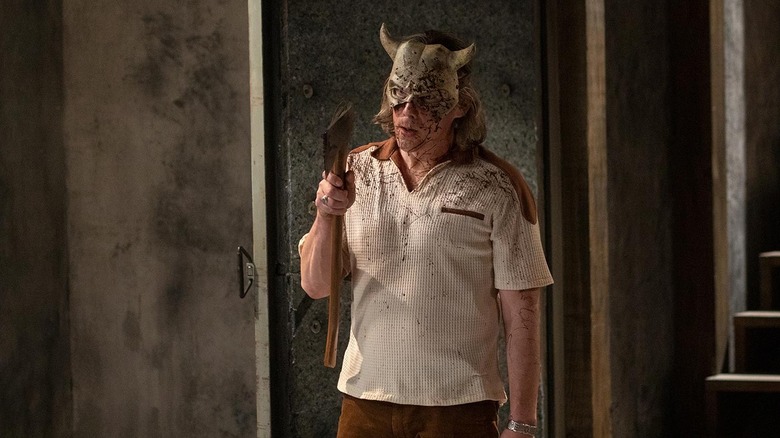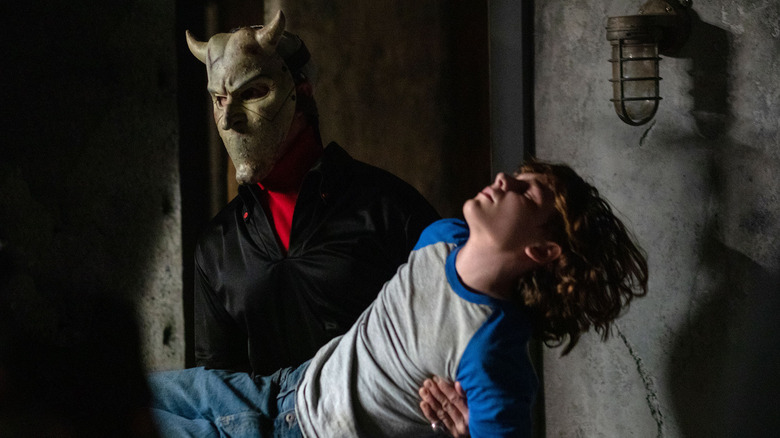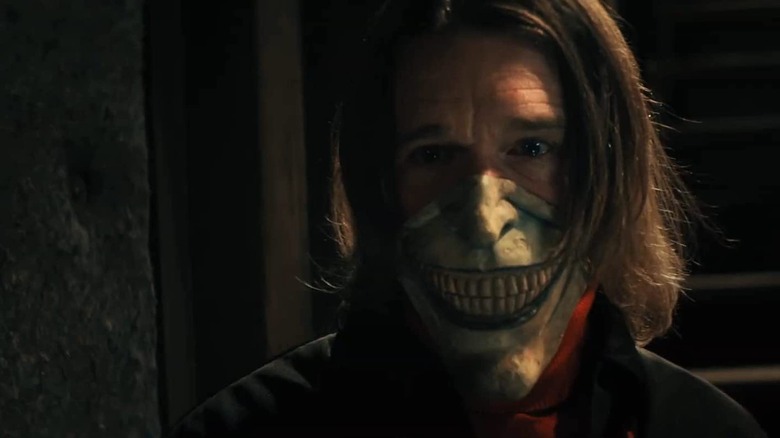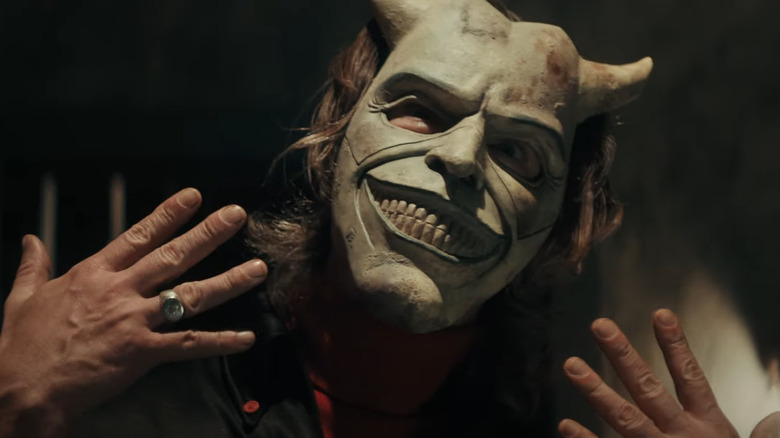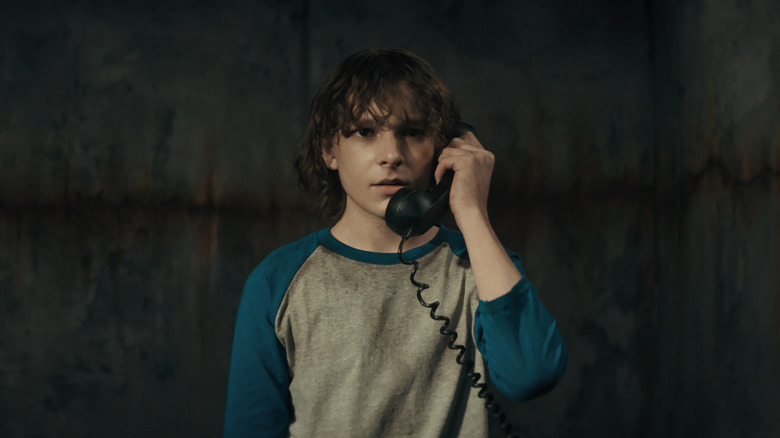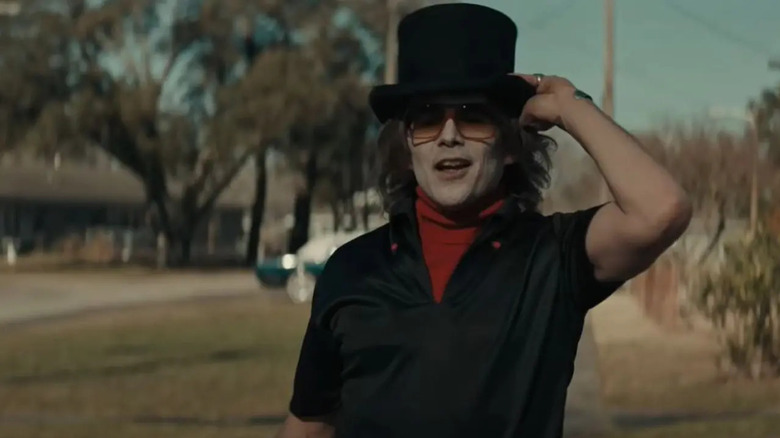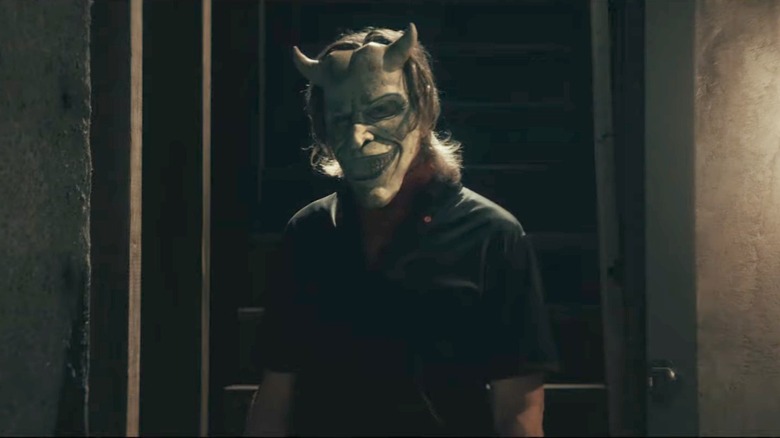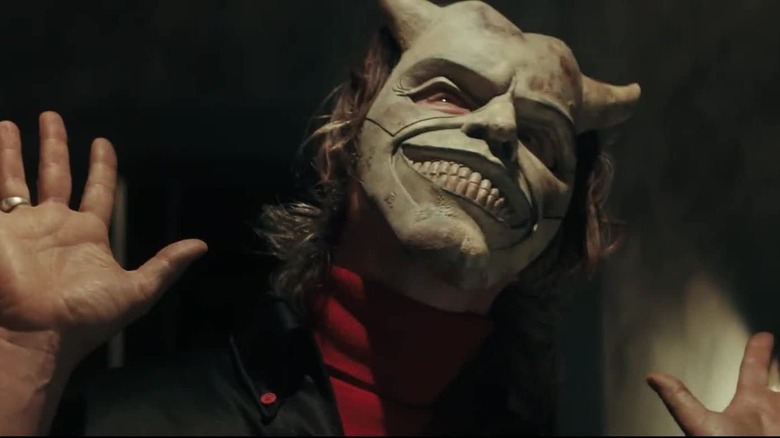The Black Phone Writer C. Robert Cargill Has Heard All The Bad Notes [Interview]
I have known novelist and screenwriter C. Robert Cargill for over a decade. For so long, in fact, that I have vivid memories of attending the SXSW premiere of "Sinister" ten years ago with a nagging feeling of obligation: "Well, I guess I need to go support my friend on his big night and grin and bear it, no matter the results!" The fact that "Sinister" wasn't just good, but really good sent a jolt through my brain. Ah, crap. My film critic friend actually knows what the hell he's doing.
All these years later, Cargill is no longer a film critic. His ongoing partnership with director Scott Derrickson has led to films like "Doctor Strange" and the production company Crooked Highway. Now, their newest film, "The Black Phone," is about to hit theaters. It's also a really good movie (I would've quietly never talked about this movie otherwise!), and while I passed off the review to another writer for professional reasons, I decided this was my chance to finally talk to my friend about his work and his career on the record. So, consider that the "full disclosure" part of this introduction: This interview, conducted over Zoom, is between two friends at the end of a long press day rather than two strangers.
During an extended conversation, I asked Cargill about the new power that comes with being a producer as well as a writer, the origin story of how he became Scott Derrickson's writing partner, how they extended a 20-page short story into a feature film, and much, much more.
'I've received all the bad notes'
I think it's hilarious that we're friends in real life, but it took months of emails with third parties because of how our respective industries operate for us to talk about this movie.
You were on the short list of people where it's like, if they don't just approve it, I'm just going to call you. And you know, you're in my D&D group. Of course you, we've got to do one of these. [My assistant] was like, "Well, we're still waiting on approval for Jacob." I'm like, "Why? What? Say he's a D&D buddy, like he's a friendly." I had to do that the other day when Michelle Swope wasn't able to get into the junket and she reached out to me and said, "Is there any way I could see a screener before I do an interview with you?"
And I just emailed them and said, "We have a disabled friendly who can't make it to the junket because. Can we get her a screener link?" And within three minutes it's done and taken care of and like, "Oh, oh very sorry. Yeah, we'll get that done." So yeah, I've been trying to juggle making sure all the good folk get to meet everybody. And then of course she got on the good list. So she got to interview Ethan and Scott and the kids. And so she was thrilled.
Are you drunk with power now that you're a producer?
No, no. I've realized how little power producers have. Yes, they can get screener links sent out, but not a lot more. It's illusory power.
But how did that change the direction of the movie? Were you able to have a bigger grasp of the picture and sort of feel more ownership because of your position?
Oh yes, absolutely. Yeah, no, the thing is, on set, it was a bigger deal. I greatly regret not being a producer on projects previously, because you're just in all the meetings and you're able to help put out fires before someone comes out and comes to you to help put out a fire, and being involved in a lot of the higher level talks and understanding and things on marketing and things like that, that I've never really had a chance to be involved with. It's a lot of fun. I really do enjoy it. And working as a producer with our own production company, I found I really enjoy producing other people's films, and helping other people get their dream projects made. And so I've actually quite enjoyed becoming a producer.
As somebody who's cut your teeth in so many aspects of being a professional writer, you know the universe finds every opportunity to take a big ol' crap on you.
Oh, yes.
So you feel like you've armed yourself with the knowledge and power and now you can try to make it better for other people.
Yeah. Yeah. And understanding their struggles and understanding what they're going through, trying to crack a thing and also understanding how to give notes, because I've received all the bad notes.
You know, I had to give the most studio note ever the other day because I'm like, "I really dig this pilot, but I know exactly what every studio suit's going to say. So just to take this with a big grain of salt, but here's my studio note." And I gave it to them, but by prefacing it like that, they knew where I was coming from and knew not to take it as a criticism of their work, but rather understanding how to possibly sell that work. And so, yeah, it's been a very interesting experience, but yeah, my experience as a writer has definitely influenced my ability to deal with other creatives as a producer.
Once I became an editor and had to start managing writers ... you start to really understand the business stuff that you don't think about when you're a writer. It's more complicated than you ever thought.
Oh, yeah. You start dealing with SEO, you start dealing with the ad stuff. You start dealing with the fact that why aren't they promoting my reviews more? And it's like, "Because nobody reads reviews anymore that aren't..." That they didn't click on from the Tomatometer [on Rotten Tomatoes]. There's so much tough stuff that when you get into the back room, you realize it's so much bigger and harder than people imagine. And you really do get a real respect for people who are writers.
'I've had this horror movie rattling around my head for a few years. Can I pitch to you?'
You've told me this casually, but I'd love to get it all on the record. I want to hear the Scott Derrickson/Cargill origin story and how the partnership came to be.
So how the partnership came to be was I was a film critic at a number of places, but most notably Ain't It Cool News. When I got in, it was the Rolling Stone of the Internet. Everyone wanted to be on the front page of Ain't It Cool News. And so I'm a 25-year-old video store clerk going to sets, meeting celebrities. People know who I am. And you know, then I go back home to this very normal, down-to-earth life where nobody at my job believes any of the stories I'm telling. They're just like, "You did not have a beer with Vin Diesel this weekend, shut up." And it's like, "No, I had three." Like, "Come on, man. What?" But anyhow, so I developed a number of fans over the years and one of those fans was Scott Derrickson, and he really enjoyed my reviews — specifically he enjoyed the reviews where I was positive about a movie that everyone else was flagging.
And whenever I did that, he would go and he'd be like, "All right, I got to watch it." And then he would love the movie and he would see it the way I did. And the first movie he wrote to me on was William Friedkin's "Bug." And he wrote me this nice letter about how he wasn't going to see it because everyone was bagging on it. And then I wrote the review I did. And he is like, "Well, I got to check it out." And he goes, "I loved it. I absolutely loved it. I'm always going to trust your reviews from here on out." And so he would write me letters every once in a while. And we became friends and he ended up inviting me to "The Day The Earth Stood Still" screening and set up a dinner where we ate at the London Restaurant in New York, owned by and the cook in the restaurant that night, the night we met, Chef Gordon Ramsey was cooking. So we had an amazing dinner and drinks and we stayed in touch.
And you know, I was invited out to Las Vegas by some friends. They were like, "We can't afford to do Vegas alone, but we can split a hotel room." And me and [my wife, Jess] had never been, so we're like, "F*** it, let's go." And I was tweeting about it. And Scott was in Vegas at the same time. And he says, "Holy s***, I'm in Vegas. I'm at a card tournament. We should get together and have drinks." I said, "Great." And so we got together for drinks and he pitched to me ... he said, "Can I get your professional opinion on something? I've got these two producers, they're bringing me this new model where they'll give me a million dollars if I bring them a good idea, and I get final cut. So let me bounce this idea off you."
And he pitched this idea to me and I gave him my notes and I said, "I've had this horror movie rattling around my head for a few years. Can I pitch to you?" And he goes, "All right, everyone pitches me once. Here's your one time: Pitch me." And I pitched him "Sinister." And at the end of the pitch, he said, "Holy f***, I want to make that movie." He goes, "I know exactly who wants this movie. This is the movie these guys are looking for. I want you to go home, write a three to five page treatment, register it with the WGA, send it to me and I'll take it out on the road to these producers." I said, "That's great." And Jess was really happy and she's like, "Oh my God, this director's taking [you] seriously." I'm like, "Yeah, great." Up until then, [I'd] had a string of things that never came together. Things that were always right there and just never, never got off the ground. And Jess used to joke that I was cursed and she always believed that I would be successful. But the universe kept telling me no, like you were talking about earlier. The universe finds a way to s*** on you if you're a writer.
The next day, I fly home. I'm completely, just barely conscious. The phone rings 20 minutes after I'm in bed. And Jess comes in and goes, "It's Scott." And I was like, "All right, I'll take it." And he goes, "Hey man, I'm sure you're probably in Vegas, but I just wanted to remind you, write a three to five page treatment, register it with WGA and then I'll take it out."
And I'm like, "All right, this motherf*****'s serious." I slept for 10 hours straight, woke up, wrote a five page treatment, registered it with the WGA. A week and a half later, I had back to back meetings with Roy Lee and Jason Blum. And they both want this movie and they both wanted Scott to direct it. And they had a bidding war over it. And Jason won and Jason believed in it so much that he was like, "Look, this idea's so good. Someone else is going to have it in six months. We're going to put it on rails and get it made." And that was at the end of January. Me and Scott had a script in mid-March and we were shooting in September.
Wow.
And so it just came together super quickly. And Scott had asked me, "Hey, normally I'd just option this idea from you, but I just lost my writing partner. Would you write this with me? And we'll see how this goes." And two weeks into writing, Scott's like, "I've never had an experience like this. Will you just be my writing partner?"
And I was like, "Well, yeah." And so then it was me and Scott Derrickson against the world. And we worked on a bunch of projects. "Sinister" was made for $3 million and made 90 million worldwide. And from there, people wanted to work with us and we'd been working our way up through the ranks until we got a Marvel film and now we've got our new movie and our own production company, and we've got a dozen different things in the works. And I was literally just the best man at his wedding. We have just become best friends. And it's a wonderful, wonderful partnership.
'The thing that really cemented it was that horror ages better than any other genre'
So my original plan was to start with "The Black Phone" and ease my way back in time. But I'll get my "Sinister" question out of the way. Because I was at that first screening at SXSW all those years ago. And I remember thinking "All right, I've got to go watch my friend's thing and be supportive." But then it became clear pretty quickly that, "Oh, man, holy s***, he's actually good at this."
I have two friends, Jason Murphy and Martin Thomas, who I've worked with at Spill.com. And they were sitting down and they're like, "All right. This is Cargill's movie, let's go." And about a third of the way through, Jason leaned over and said, "Is it just me? Or is this actually really good?" "Yeah, it's really good." And by the end they were just like, "Holy s***." And it was really weird because that screening is hilarious, because I had 10 invitations to invite 10 people that I could put on the list to be at that screening. 37 people claimed they were with me. People who couldn't get in because of the line, said, "I'm here with Cargill." At a point, [the studio people] just started waving at me. Just like, if they're with Cargill, just let them go. They're a film critic.
I suppose that's the problem when you have a tight community.
We are a very incestuous community, but it was also amazing, because the world premiere of my movie is full of my friends and all my friends got to see that I wasn't full of s***. That I actually kind of knew what I was doing and could make a movie that they enjoyed. And that meant a lot to me.
I don't know if you saw this, but last year, the /Film horror braintrust, the writers who create our horror lists and editorials and articles, put together a list of the scariest scenes of all time. And when we all voted, the number one scene, by a clear margin, was the lawnmower scene in "Sinister."
Oh, thank you.
It's not just your friends. You made a scary movie.
Well, I mean the thing that really cemented it was that horror ages better than any other genre. No genre ages like horror and movies that are considered mediocre will get reexamined, and will be considered good. Movies that were good will be considered great. Movies that were bad, if they're not boring, will be considered fun. You know, movies don't feel out of date, they feel period after a while. And so you get that experience. But when that college did a study on the scariest movies of all time and did it scientifically, and then our movie was number one and was rated the scariest movie of all time, that created a big debate.
And the debate was the win. Being declared the scariest movie of all time, that's really subjective stuff even if you do track it scientifically. But the fact that people were talking about it and questioning whether or not "Sinister" was the scariest movie of all time, that's what you pray for as a filmmaker. That we're even in the conversation. So the fact that conversation happened meant a lot. The fact that people think that the lawnmower scene is the scariest scene ever made means a lot to us. And once we saw that, we were like, "Wow, we made something that people will be talking about in 20, 30 years." Which is all you can ask for as a filmmaker — that you make something that might outlive you.
That's the hope that you don't want to end up on a dusty shelf and be that film that some college kid goes, "Oh, you've never heard of this obscure movie in which there's only a hundred VHS tapes? Well, I have three of them. So here, you borrow one of them and watch." You don't want to be that movie that somebody recommends like good drugs they've never heard of. You want to be that film that teenagers watch because they're like, "Oh, I've never seen it. So I guess I finally have to watch it." So the fact that we got to be that film was pretty incredible.
'Well, that's rad. Let's do that'
Okay, let's swing back around to "The Black Phone." I'm interested in your first exposure to Joe Hill, because I know you both run in the same author circle. You're both novelists. Am I incorrect in saying that you knew each other before you adapted his work?
Oh, yeah. No, we're good friends now. And it's a very convoluted story because essentially Scott handed me "Black Phone" right after we wrote "Sinister." So we wrote "Sinister" in that March and Scott was trying to think, "What are we writing next while we're prepping this movie?" And he goes, "I read this great story years ago. I thought about it, it's by a guy Joe Hill. Read it." I'd heard of Joe. And I'd heard the story of Joe. So I had respected him because just before Scott handed that to me, Joe was outed. You know, the great thing about Joe is he's Stephen King's son and he did not want to be known as Stephen King's son. So he dropped the King from his name and published, starting in the UK, under Joe Hill. But he never did any public appearances, would not put a picture in the books. So nobody knew who this Joe Hill guy was.
So he built his own reputation on his own and then somebody kind of put it together and figured it out. And so he came clean and he is like, "Yeah, I'm Joe Hill King, but I'm going to publish under Joe Hill. And yeah, Stephen King's my dad." So I was aware of him and I read the story and I loved it. And so I went out immediately and bought "20th Century Ghosts" and read it cover to cover, and loved it. And weirdly my first book was published shortly thereafter. His girlfriend became a big fan of my book and would not stop talking about it to Joe. And so Joe ended up connecting with me online, and we followed each other on Twitter. And shortly thereafter, my editor left the business and I ended up with his editor at Harper Voyager. And our editor was like, "Well, you two boys are like peas and carrots. You guys need to get to know each other and hang out, because you guys will be best friends." And so we started getting to know each other. And they started putting us on press tours together. "A Night with Joe Hill Interviewing C. Robert Cargill," and vice versa, because we had books come out at similar times.
And so we became really good friends and sure enough, when Scott and I had decided to that we wanted to adapt "Black Phone," it was just like, "Well, let me call Joe." And I called up Joe and was like, "Hey, where's the rights to this?" And he's like, "Well, actually somebody just let them lapse. Do you want them? You can have the friend rate." And I was like, "Well, done." And so Joe is a very big part of the process. And we adapted the script. He was a big supporter of it and has been a huge supporter of the film. He's really proud of it. And it's been great. Joe and I even at one point, the version of "Locke And Key" that was at Hulu, he and I wrote an episode together. So we've actually written together, too. So we've become good friends. He's a really great dude and I love him very much.
I just spoke to him right before you. Clearly, he was trying to be humble about it, but the story he told me that I thought was really interesting was the big change you guys made after the success of "It." You made The Grabber into a magician instead of a clown. He talked about the origin of the mask as an old school magician's mask. Can you talk about that choice? Because it really is one of the biggest departures in the adaptation.
It was something that he recommended because he came to us and he told us the story as he probably told you, so I'll let you quote from there. But yeah, we said, "Yeah, we're fine changing it from a clown. We're not married to the clown aspect, but what do we replace it with?" And he goes, "Well, I've always been kind of obsessed with these '30s and '40s magicians who would do a magician act that was half magician and then half devil. And they would go back and forth between these characters." And we said, "Well, that's rad. Let's do that."
So that's where Scott kind of came up with the whole ... he started working on the idea of the mask and the theatricality of it. Joe was so thrilled that he had forgotten he had done this. And Scott had never heard the story until yesterday, but he slipped a "Black Phone" Easter Egg into that Shudder animated series that he and his dad did. [Note: It was the "Creepshow" animated special.]
He and his dad did an animated movie that was one of Stephen's stories, and then one of Joe's stories. And they were completely animated and it came out during the pandemic because it was the perfect kind of pandemic thing. And in there, it's like you're reading a comic, like one of those old EC Comics, and there's an ad for a magician devil gag. And it's a whole allusion that he slipped in there for "The Black Phone." And I asked him about it once and he goes, "No, I didn't — oh, wait. I did do that. Holy s***. I forgot about that. I forgot that I did that. I put a 'Black Phone' reference in that nobody would get except for you." And so sure enough, when I saw it, I was like, "Oh, Joe did this for us." And so if you go back and watch that, you will see an early allusion to "The Black Phone" kind of tying it into the whole King/Hill universe.
'People would just feel sorry watching a duck get beaten for two hours'
I re-read the short story earlier today and I was reminded that major parts of the movie have their origins in the margins of the story. Like the sister character, Gwen, whose entire movie storyline comes from a brief daydream on the page. Can you talk about searching through those 20 pages to sort of extrapolate the details for the movie?
Yeah. That was the whole reason we didn't make the film in 2011 and try to option it was ... there's no first act in that story. Like, it starts in the basement and we get little hints of his life. We don't fully understand his life. We don't know who Finn is. We don't know what his home life is. We have just the barest wisps of information. And so we knew we needed to build that out. And when Scott brought me the idea of making a movie about the trauma of his childhood and just how dark his childhood was growing up in Denver in the '70s, when we put this together, when we put those two elements together, it was peanut butter and chocolate. And we're like, "Oh, we've got a Reese's Peanut Butter Cup now. So now we just need to build it out and fill in the pieces."
[Warning: Light spoilers in the next paragraph.]
And I really like the idea of the sister looking for him. We wanted to make a movie about the resiliency of youth. And we knew that we were going to want a violent drunk father character — that was very much baked into this. And we needed to give him some level of hope. We needed to give him something to show why he was being resilient. What did he have in his life? You can't just ... a friend of mine, Martin Thomas, who I mentioned earlier, referred to "The Passion of The Christ" as a ludicrous movie, because if you replaced the Christ character with a duck, you'd have the same movie. People would just feel sorry watching a duck get beaten for two hours.
And so you got to be careful about just pounding on this character over and over before you kidnap him and throw him in a basement and threaten him with a violent, terrible murder. And so I thought, "How great would it be if he had a great loving relationship with his sister and they were this dynamic duo together, trying to survive this s***** life?" And we built upon that and built that up and thought it would be really cool that she had psychic powers that she'd inherited from her mother. And that also explained why he can hear the phone and other people can't hear the phone. And like it just all kind of came together. And then Gwen ended up becoming my favorite character I've ever written.
She's so funny. In the darkness of the movie, she pops up just when you need her to like to give such huge laughs.
There's a line that I wrote in the script that is one of the sentences I'm most proud of in my career. And it said, "Gwen is sunshine in the apocalypse." And Maddie brought that to this movie. She read that line. She got that. And she's very much that. She shines a light into this movie every time she shows up, and helps ease up how dark and terrifying the film can get at times. So she really, really brought it. But yeah, I'm so proud of that character.
Was there ever a temptation, when you're writing a villain like The Grabber, you add the mask, you get Ethan Hawke in there ... was there ever a point where you start going, "We should give more to him?" Because the movie is restrained. It lets Finn be the main character.
Yeah. There was a note and it came very late in the test screening process where people in the audience were asked, "What do you feel is missing from the movie?" Which is a leading question to begin with, but they're like, "We want to hear more about The Grabber." And they're like, "Yeah, I want to know why The Grabber's there." And it's like, "No, you don't. You think you do." Wanting to know more about The Grabber is good. That's good. That causes you to dig in and try to find what threads we put in the movie, because there's lots of stuff. There's a lot of dense material about who The Grabber is buried into that film, but you don't need his backstory. What I think Michael Mann calls the rubber ducky scene, where it's like, "We need to know why he's a bad guy." "Because someone stole his rubber ducky when he was a kid." Like, "No. You don't need to know that."
For us making horror films like "Sinister" and this, it's all about restraint. You're given all the tools in the toolbox, so why don't you use them? Well, because you don't need all of them. And because when you want to generate certain things, you don't always have to go too far. You don't need to show a lot of blood and guts to scare people. You don't need to have a lot of false scares to get people on edge. You just need to create a sense of tension and dread, and more to the point, a character that audiences care about.
The more they care about that character, the more they love that character, the more scared they're going to be for that character. And I think that's what we — by focusing on Finney, that's what makes people scared. Making The Grabber scarier or making us understand him more doesn't make the movie scarier. Making Finney more likable, making us love him, making us want to see him survive and get out of that basement, is what's going to make people scared. And so you've always got to focus on that protagonist and on that character and give enough to the villain that they aren't one-dimensional. You want them to have multiple dimensions to them. But what you don't want is for the movie to be about the villain. You want it to be about your protagonist. And so showing the restraint to do that is part of the process.
'The one thing that all movies share in common is there's never enough money and there's never enough time'
This is a nuts and bolts screenwriting question, and one I'm just curious about because I always hear conflicting screenwriting advice. You told me earlier that you described one character in the script as being "like sunshine in the apocalypse." You clearly are trying to paint vivid images into your screenplays. But other writers have said you should keep the colorful language out of scripts. So how do you manage to build out, let's say, a horror sequence? How do you keep it scary and actually paint the picture of terror for the reader?
Short, tight sentences. There's a weird psychological effect. Long sentences make people comfortable, short sentences make people tense. And what you do is as you get into the scene, you start shortening up your sentences and then you start using paragraph breaks and you start using just straight up single lines of what's happening. Because in horror, horror has a weird thing to it that it is longer on the screen than it is on the page. Because a single sentence of, "Ellison walks down the hallway very slowly carrying a bat." It takes you three seconds to read that sentence, but that's 30 seconds on the screen.
And so you want to give people that slow-paced tense feeling while they're reading that scene. I mean, there's advice about how you shouldn't put purple prose into scripts and that's been changing a lot in recent years.
You don't want to do it too much, because you often have people spending half a paragraph giving us poetry that's never going to read. But there's a big change in how screenwriters are writing character descriptions, because we're moving away from "Maddie, nine, white. Young girl dressed like this." Like we're moving away from that and more towards the impressions of the characters, as to give more options for casting.
And to give tools to the actors and actresses, where [it goes from], "Oh yeah, I can play a nine-year-old white girl," to, "Can I play sunshine in the apocalypse? Can I be that sunlight in someone's dark life?" And that one line gives an actress a lot to play around with and a lot to build on, especially when they're coming into audition. As opposed to, "Well, now I've got to try to read into the nuance of all this stuff."
And you're seeing more and more screenwriters writing single sentence descriptors of characters that just give us who their character is in a nutshell. So that we then get it while we're reading it. Because there's a lot of stuff that comes from performance that you never can experience on the page. And so giving a little bit of that flavor, a little bit of poetry in your description can go a long way for an audience to really get what this character is. And so that's pretty much that.
You made "The Black Phone" after working on "Doctor Strange," and being deep in the Marvel grind of working in a very large machine with a lot of moving parts, a lot of eyeballs. What was the transition from that like, from a massive machine to something smaller where you have more personal control?
Well, I mean, the thing is that the one thing that all movies share in common is there's never enough money and there's never enough time. You know, we had to cut more pages from "Doctor Strange" because of budget than we've had to cut from our small horror movies. They're two very different beasts, though. When you're making a four-quadrant movie, you're trying to make something that can appeal to everybody.
Whereas when you're making a smaller budget movie, you can make something that doesn't appeal to everybody, that's not for everybody. We got a couple calls from the studio along the way going, "Can this movie be PG 13, because it feels like it's R?" And we're like, "No, this is a rated R movie. We're not cutting the language out." It's not a gory movie, but this is not a movie for younger audiences. We're making a very adult movie here and you get the freedom to do that. But I loved working in the Marvel machine. I love everybody at Marvel. I would gladly do it again.
It is a machine, but it's a machine full of people that love comic books, love the movies they're making, that are all incredibly talented, that are great to work with because they do a really good job of filtering out the bad folk. So everyone you encounter on any given day is a genius at what they do and a treat to work with.
I remember on the day that the Oscars were announced, we were shooting. And there were several members of the crew congratulating each other on their nominations. We were surrounded by people who'd won Oscars and who were nominated for Oscars, for cinematography or for editing, or for sound, or for makeup effects or for costuming. And all these incredible people are working on your show and it's a real treat.
Whereas there is a kind of punk rock vibe of going and making a smaller film with a smaller budget and working with all these geniuses who are coming up in the industry and will one day be at that point, but are just now cutting their teeth or have decided not to go out and go into the machine because they want to live and work in Wilmington, because Wilmington rocks. So there's not a huge difference. It really is very similar.
There are different development processes. I mean the biggest difference between "Strange" and "Black Phone" is we shot pretty much the movie we wrote in our first draft. Whereas with "Doctor Strange," I wrote drafts for nine months for a myriad of reasons. Never because it wasn't good enough, but always because, "Can we make it better? Can we do this? Can we change this? We've got another film that's doing something similar. So can we do this?" And it's always trying to craft something that fit into its own space in the MCU, that wasn't just a carbon copy of everything else. And Marvel was fighting for that just as much as we were. I mean the greatest thing I can say about Marvel is every time we turned in a draft, Kevin Feige would be, "This is awesome. Can we make it weirder?" And we're like, "Yeah, we can make it weirder."
There's this feeling that Marvel tries to spit out the same content all the time. And they're really not. I think it's an unfair criticism. They're always trying to do something different and push the envelope and make a type of movie that they know audiences will love, but that is different from what's come before it. And so, yeah, I really enjoyed that experience.
'I hope that's the experience that a lot of people have with this movie'
You emphasize the R-rating here, but the movie, as dark as it gets, it's a crowdpleaser. It's a coming-of-age movie. A brave pre-teen could watch it and enjoy it. I could talk my mom into seeing it. Was this part of the plan?
Very. In fact, we joked about it while writing "Black Phone": "Hey, what if we made a movie that was the movie for people who hated the ending of 'Sinister?'" We wanted to turn into the skid. You know, the thing is, as artists, you have to reflect the times. But what that means is you don't necessarily give the audience what they're experiencing right now.
So when we made "Sinister," we'd killed Osama bin Laden. The War on Terror was winding down. Obama was president. It felt like things were going to be okay. We were addressing real problems. It felt like we were moving in the right direction. And at that period of time, people want to see art that shakes them awake and shows them that the planet isn't great, like everything isn't okay. They want to have that feeling of dread and be knocked out of their comfort zone.
And right now we're in times where everybody feels like the earth is on fire. There's a whole generation that believes they won't have an earth to grow old in. We turn on the television or social media and it's doom and gloom and people want to watch something that makes them happy. People want to go to the movies and they want to cheer. We've seen that with "Top Gun: Maverick."
Nobody anticipated that "Maverick" was going to be this big a hit, except the people who made it, who knew what they had. And people are cheering and having a good time and coming out happy and going, "Yeah, that's why I go to the movies." And we wanted to make a movie like that. And it feels like people are responding that way.
And so we're really happy that this can be that summer movie, that summer horror film that audiences can watch. And I'm hearing from lots of people that there's cheering at screenings and not like ... you're used to that at like a Fantastic Fest, or a Beyond Fest screening, or SXSW where you've got genre fans and they know filmmakers are in the audience, so they're going to react that way. But you know, at an AMC screening, outside of a filmmaking town, to hear that people were on their feet and cheering at the end of the movie, it's like, "Holy crap, we did that? Oh my God, that's so great." It's just such a great compliment. And I hope that's the experience that a lot of people have with this movie. I hope people enjoy it that much.
"The Black Phone" hits theaters on June 24, 2022.
